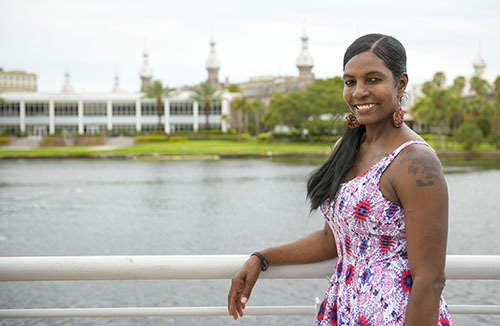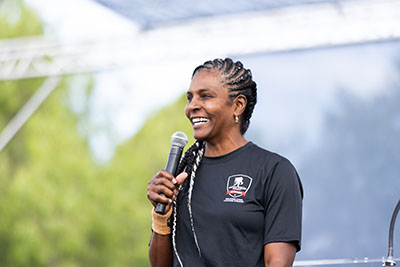Words of a Woman Warrior: From Soldier to Civilian in the Workforce

Warriors face challenges with adapting their military skills in a civilian workforce that is often not prepared to help veterans thrive. For women warriors, this can be even more difficult.
According to the 2023 Women Warriors Report conducted by Wounded Warrior Project® (WWP), the unemployment rate among WWP™ women warriors is higher than among male warriors. For the 10% of WWP women warriors who are unemployed, the top-reported barriers include mental health or psychological distress, lack of skills or knowledge to translate military skills to the civilian workforce, and family or childcare responsibilities.
One woman warrior who faced those challenges is Army veteran and WWP spokesperson Tonya Oxendine. WWP sat down with her to learn more about her experiences transitioning into the civilian workforce.
Question: What workforce skills did you develop in the military?
Tonya: During my military service, I was on a journey of rigorous training and unforgettable experiences that shaped my skill set. These invaluable skills became pivotal as I transitioned to civilian life.
From learning to adapt to ever-changing environments to mastering the art of preparation and planning, problem-solving, and navigating through adversity, each skill became a cornerstone of my success. Whether leading a team through challenging missions or fostering unity among diverse groups, I relied on these abilities to overcome obstacles.

Question: How did your military skills help during your civilian job search?
Tonya: Military members have a “can-do” mentality and, together, we faced challenges head-on, relying on hard work and determination to achieve our objectives.
As I transitioned to the civilian workforce, I carried this invaluable lesson with me. Dedication became my secret weapon, empowering me to tackle even the most daunting tasks with confidence and efficiency.
Question: How did your unique experiences as a woman warrior prepare you for post-military life?
Tonya: My experiences in predominantly male-dominated fields have shaped me into someone who values acceptance above all else. We're all guilty of relying on stereotypes in our daily lives, categorizing people based on gender, race, age, wealth, and more.
I've faced my fair share of rejection and stereotypes along the way. When women are judged by these unfair standards rather than their true capabilities, it hinders their progress in climbing the career ladder. While I acknowledge that I may not possess all the same abilities as men, my drive, discipline, and perseverance have always kept me focused on making a positive impact, both in my own life and in the lives of others.
Watch Tonya discuss the importance of empowering Women Warriors
Question: What challenges did you face when you entered the civilian workforce, and how did you overcome them?
Tonya: I faced both challenges and opportunities. The question of whether I would be embraced as a civilian employee was on my mind, casting shadows of doubt over my confidence. Although I served nearly three decades in the Army, finding meaningful employment weighed on me. My perceived lack of civilian experience, the perception that I may not integrate smoothly, and the potential challenges with my mental health all worried me. Yet I reminded myself that my military background provided me with valuable skills like decision-making, resilience, teamwork, and attention to detail, all of which would serve me well in the civilian workforce.
The unemployment rate for WWP women warriors is four times higher than the U.S. veteran population.
Thanks to Wounded Warrior Project, I found that support ... Programs like Warriors to Work also matched me with meaningful work. I was matched with my vision, and not just a career, but my calling.
Question: How has WWP helped you transition to civilian life, including the civilian workforce?
Tonya: My employment journey has been quite the ride. I resigned from a good job because of a lack of meaning and purpose. But I also needed space in my life to take care of my mental health.
Thanks to WWP, I found that support – support for my mental health struggles like post-traumatic stress disorder (PTSD), military sexual trauma (MST), and depression. Through WWP’s Warriors to Work® program, I received resources for resume assistance, and I participated in networking events and activities to build and maintain professional relationships. In addition, Warriors to Work ultimately matched me with meaningful work.
I found my vision, and not just a career, but my calling. When I was matched with this amazing job I have now as a spokesperson for WWP, I felt free, I felt at home, and I felt whole, just like I felt while serving in the Army for almost 30 years. If I can be a part of an organization that helps people heal and find peace, then the end of my service is not the end. I’m just serving in a new way now.
Warriors to Work® provided women warriors with more than 17,500 career coaching services. Women warriors who participated had combined salaries of $20.4 million in FY 22.
Question: What misconceptions do people have about veterans in civilian jobs, particularly women warriors?
Tonya: In a world filled with misconceptions about veterans, two prevalent ones always seem to stand out. The first is the assumption that all veterans grapple with PTSD and are rigid or strict. The second misconception, particularly affecting women veterans, revolves around translating military expertise into civilian terms. Take, for example, a female veteran skilled in handling explosive devices. Transitioning from military to civilian life presents a unique challenge for individuals like her. Despite possessing a diverse skill set, effectively communicating this expertise in civilian terms can be difficult. Some civilian employers may not fully understand or appreciate her skills, leading to misconceptions about female veterans’ qualifications for civilian employment. These misconceptions highlight the need for greater understanding and support for all veterans transitioning from military to civilian life, especially women.
Of WWP women warriors who are unemployed, nearly 30% say that lack of skills or knowledge to translate military skills to the civilian workforce is a barrier to employment.
Contact: Kaitlyn McCue, Public Relations, kmccue@woundedwarriorproject.org, 904.870.1964
About Wounded Warrior Project
Since 2003, Wounded Warrior Project® (WWP) has been meeting the growing needs of warriors, their families, and caregivers — helping them achieve their highest ambition. Learn more.